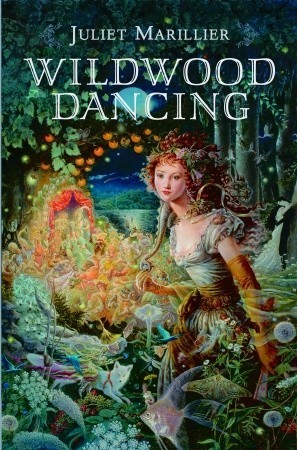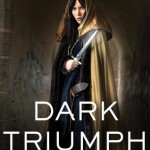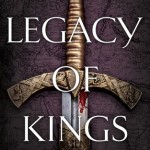 Wildwood Dancing by Juliet Marillier
Wildwood Dancing by Juliet Marillier Series: Wildwood #1
Published by Knopf on January 23, 2007
Genres: Aussie YA, Fairy tales, Fantasy YA, Retelling, Sisters, Young Adult
Pages: 407
Format: Hardcover
Source: Library
Amazon • Barnes & Noble • Goodreads

High in the Transylvanian woods, at the castle Piscul Draculi, live five daughters and their doting father. It’s an idyllic life for Jena, the second eldest, who spends her time exploring the mysterious forest with her constant companion, a most unusual frog. But best by far is the castle’s hidden portal, known only to the sisters. Every Full Moon, they alone can pass through it into the enchanted world of the Other Kingdom. There they dance through the night with the fey creatures of this magical realm.
But their peace is shattered when Father falls ill and must go to the southern parts to recover, for that is when cousin Cezar arrives. Though he’s there to help the girls survive the brutal winter, Jena suspects he has darker motives in store. Meanwhile, Jena’s sister has fallen in love with a dangerous creature of the Other Kingdom–an impossible union it’s up to Jena to stop.
When Cezar’s grip of power begins to tighten, at stake is everything Jena loves: her home, her family, and the Other Kingdom she has come to cherish. To save her world, Jena will be tested in ways she can’t imagine–tests of trust, strength, and true love.
Fair warning, all. I had more to say about this one than I thought I would!
WILDWOOD DANCING by Juliet Marillier, a retelling of the 12 dancing princesses story, was magical and engrossing. The whole setting of it was so unique and clever: 12 dancing princesses in ROMANIA?! What an excellent idea! Also, while this story is mainly the retelling of the dancing princesses, it is also a retelling of The Frog Prince. That part of WILDWOOD DANCING is important, but I found the story about the sisters–or, maybe one or two in particular in Jena and Tati–to be at the fore. And it was so well-done. I was enraptured by the atmosphere and the characters and the fullness–I never felt like there were holes in the story, things that skipped around or were skimmed over. The setting–medieval Romania/Transylvania, I think was the time period–was unlike anything I’ve read before, and it complemented perfectly the darkness and the eeriness of the story. But it was the characters who were my favorite thing. I had so many very visceral reactions to them and the things they did–good and bad–that, to me, is the true hallmark of a particularly well-done book.
The characters in particular were complex, well-rounded, and engaging. (Well, all of them except one. We’ll get to that one in a sec.) Jena, to me, was especially awesome. She was a great character in so many ways. Confident, resourceful, practical, reliable, spirited, and smart. She put the welfare and well-being of her family before her own and was fulfilled it seemed. Clearly, she had assumed the role of mother after their own had passed away. However, saying that a young girl is reliable, practical and motherly isn’t always necessarily a compliment. Sometimes you want the young girls to be…young girls, you know? Because acting like a mother has its downsides as well, and Jena was controlling, bossy, type-A, and a little judgmental. In another author’s hands, in a different kind of story, Jena might have been a touch unlikable. But not here. She was instead easy to admire and respect and empathize with. Whatever tensions or worries she felt, I felt, especially when it came to her concerns about Tati, because it was clear that above all else, her sisters were her loves and she wanted the best for them. I could never fault a character so well-meaning and devoted. (Tati is another matter.)
Jena, I thought, handled Cezar especially well, given that he was the kind of villain who is the most infuriating: short-tempered, condescending, presumptive, cruel, and sexist. Occasionally, though, the things he said to Jena made a little bit of sense, and he wasn’t so hard that he couldn’t show some cracks in his exterior and let out what, to him, were real emotions. I believe that he thought he felt real love for Jena, and I knew that he obviously had strong emotions about what happened to his brother, Costi. But even those instances were colored by his selfishness and his prideful ego. He often reminded me of an after-school-special boyfriend, who is always trying to convince his girl (in this case, Jena) that he knows best, he’s right and she’s wrong, they’re meant to be even if she can’t see it, and since he’s the man and knows all of these things that she, as a girl, could never know, she needs to listen to him and do what he says. Jena resisted him time and again, and while I always rooted for Jena, I couldn’t help but sometimes feel a little sad for Cezar, that the things he thought would bring him happiness and fulfillment would always be just out of his reach.
I’m not going to talk too much about the relationship between Jena and Gogu/Costi because I really didn’t have any issues with it and because it was another relationship that really got my goat here. Tati and Sorrow. *Sigh* These two…were VERY conflicting. On the one hand, most vampire-human relationships in YA these days seem silly and overblown in comparison to this eerie, quiet, mystical, and in the end simple love. (I love the way Juliet Marillier worked in the vampire legends of Transylvania. Seriously, you would never guess that they aren’t part of the original tale, so seamlessly are they integrated.) Tati and Sorrow are not in love and, you know, facing down the greatest apocalypse of evil together because one of the other of them have some singular gift or trait. No, they are just two crazy kids from different sides of the tracks who fall in love despite family objections and preconceived notions. It is at it’s core a simple love story between them. On the OTHER hand, though, sometimes the stillness and silence of their being together was a little odd or creepy to me. (Sorrow, for most of the story, is unable to speak.) Sorrow was unsettling to me until the end, and I almost right away groaned outwardly at Tati’s reaction to their meeting and their instant affection. She struck me in the beginning as a girl with a little more sense, and so I was a little surprised that she became so instantly infatuated and fascinated with him and so easily and wholly seemed to desert her responsibilities to her family, who was struggling through the winter without their father. Tati completely left Jena to flap out in the breeze alone, deal with the house, the other girls, Cezar, everything. She went from the oldest and a leader of her sisters to basically willingly useless. Not a fan of that at all.
As WILDWOOD DANCING progressed, I had an increasingly hard time respecting Tati. She moped. She wandered off. She withdrew from anything resembling a good relationship with her sisters, who relied on her. She stopped eating. She was literally on the verge of death. Is it really that impossible to communicate true depth of feeling without a person shrinking down so far as to be nothing more than lovestruck and literally ill and consumed? At one point, Jena offers this thought: “Before she met [Sorrow], Tati had been healthy and happy. Folk didn’t actually waste away for love, did they?” In my experience, no they don’t. Nor do I think they should. In other books this somehow doesn’t bother me as much. I don’t remember reacting this strongly to Bella when she went off the deep end when Edward left! Tati lost her fire, her backbone, everything. The only thing that made her Tati was her literal lovesickness. Something about Tati and Sorrow seemed less ridiculous, though, than Edward and Bella, and so I perceived their relationship as a little more sincere and real, but this only made Tati’s essential desertion of her family harder to bear. Tati became nearly one-dimensional.
But like I said, this was conflicting. I wanted them to be together, just not at the expense of Tati. It’s one of those instances that almost makes me a little sorry for my modern female sensibilities, that I just can’t see past the melodramatics and get to the romance of it: the seeming love at first sight, the all-encompassing need for another person, putting your connection with one person ahead of even your own well-being. Just the fraughtness in general. But I can’t. It was too much here for me to overlook my natural inclination to shake Tati and tell her to “snap out of it”, as (a little unfairly in my opinion) happened with Jena. Why did none of the sisters get so annoyed with Tati that they called HER out? She was the more egregious offender by a country mile, and they all let her off the hook for it.
In the end, though, this was the only real problem about WILDWOOD DANCING by Juliet Marillier, to me, and I can’t believe it took me so long to get to it! I’ll be reading lots of her in the future, no question.














YES YES YES! More Marillier, she’s an author to put in the love pile because all of her books are so fantastic. If you loved this book, I am going to have to recommend Daughter of The Forest to you because it is brilliant and wonderful and engaging and magical and amazing and makes me type in run-on sentences to try and describe my love for it.
Okay and seriously that Cezar was such a jerk. Ugh. I could not stand up.
And I agree about Sorrow being a weirdo, I mean, that isn’t quite what you said, but he def unsettled me.